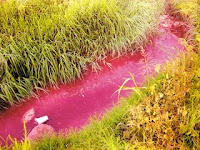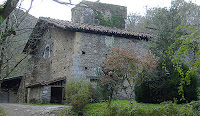Last week I attended a commemorative mass with F's extended family. All of them are Euskaldun Zahar, or people who speak Basque as their primary language, and the mass was in Euskara also. Spanish has gotten a wee bit easier for me through sustained effort, but I haven't done much with Euskara, so going to mass in that language makes me feel like I'm rocking out Mr. Bean style:
In any case, the history of Catholicism in the Basque Country is pretty interesting, if also complicated. Like a lot of places that have been majority Catholic during its recent history and where the church has exerted serious political influence, you often have a separation between people's perceptions of the rank-and-file priests and nuns who directly serve their communities and the higher-ups who consorted with kings, and who helped to make several decades of fascism possible.

Here in Lasarte, the town was originally based around the convent, which started in the 1100s. The convent used to have sprawling gardens in the back to support its residents, which have now been turned into lawns that are open to the public. The only folks I have seen around in traditional nuns' habits are either quite old or non-European. This evolution from town center to half-empty historical site is a pretty good representation of what is happening to Catholicism in this region, and to organized religion in Western Europe generally. On the one hand you have the small-town Basque priests who preserved and protected the Basque language even when it was banned during Franco's

time (which constituted a large part of the formative years of F's parents' generation). You have the
Mondragon Corporation, which is a very successful group of business cooperatives that is co-owned by its workers, revered for its fair practices, based in part on Catholic social justice principles, and was started by a Basque priest. On the other hand, the clergy were traditionally among the ruling elite, and there is a strong strain of anti-elitism within the Basque culture. During the 1930s, the Basque Country was part of the Second Spanish Republic, which gave it relatively more autonomy, was anti-monarchy, and anti-clerical. Franco was able to overthrow the Republic after a very violent civil war, which included the famous bombing of
Guernica in the western Basque Country. He allied himself with the more traditional Catholic bishops as a defender of the church's values (really, their standing and power within the Spanish state) and tried to squash the use of other languages besides Castillian Spanish. You can see why people have mixed feelings about the church. Holidays still have a religious basis, but the average age of the parishioners at any given mass has got to be like 60 and not a lot of people are in attendance. Nearly all marriages in this province are held by a civil authority alone. There are a couple small storefront Evangelical churches that are mostly attended by Latin American immigrants, and you occasionally get a knock on your door from Jehovah's witnesses, but a substantial portion of people from our generation and younger do not subscribe to any particular religious tradition. Children are sent to religious education classes en masse but they usually stop attending church in their teens. It is a pretty sudden change in the orientation of this society and it is hard to say what it means for the traditions and the culture of the region. It does make you wonder, though, how much of a religious faith depends on its relation to the secular culture. What makes it relevant, or not? Do changes in community structures, like the adoption of the internet and increasing prosperity, drive these kinds of changes? It seems inexorable and vaguely sad, but perhaps it will make for an eventually more progressive branch of the church, or something else completely. In any case, that is quite enough armchair anthropology, and there are churros to be had..until next week (or the next funny poster I see in the street...)
 The Basque Country is strong in environmental conservation and clean energy production-possibly because it has more industry than other parts of the Iberian Peninsula and has suffered stuff like this (borrowed and undoctored) photo shows-paper factories give off effluent that looks a lot like wine when it runs off in the river. I haven't seen this for myself but I understand it used to be a lot more common when the paper factories were running full-tilt.
The Basque Country is strong in environmental conservation and clean energy production-possibly because it has more industry than other parts of the Iberian Peninsula and has suffered stuff like this (borrowed and undoctored) photo shows-paper factories give off effluent that looks a lot like wine when it runs off in the river. I haven't seen this for myself but I understand it used to be a lot more common when the paper factories were running full-tilt.

 excellent natural reserves. Last weekend we headed out to Pagoeta, which had one of the most fastidiously-labelled botanical gardens I've ever seen. They had a large assortment of holly, which is a threatened species (good I was warned-I've been propagating plants to beat the band on our balcony) and lots of hardwood trees. There was a dog motel and a hydro-powered iron forge along the way.
excellent natural reserves. Last weekend we headed out to Pagoeta, which had one of the most fastidiously-labelled botanical gardens I've ever seen. They had a large assortment of holly, which is a threatened species (good I was warned-I've been propagating plants to beat the band on our balcony) and lots of hardwood trees. There was a dog motel and a hydro-powered iron forge along the way.

















